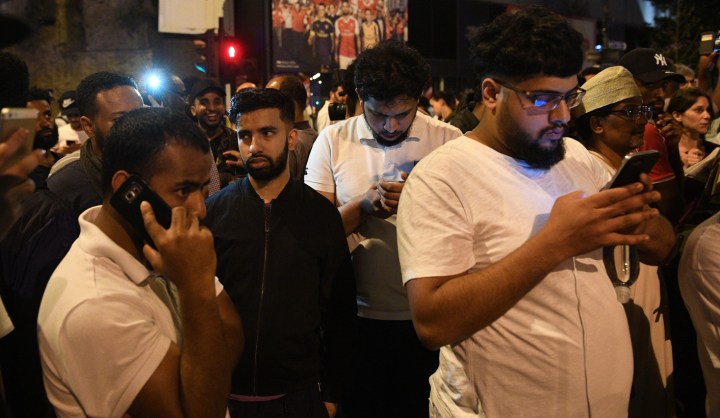World
Analysis: Revisiting the idea of unified nations in western states can no longer be ignored

Responses to a man ramming a vehicle into Muslim worshippers at the Finsbury Park Mosque in London, killing one person, reflect a concerning embedded psychological construct of societies that can no longer be ignored. By JASMINE OPPERMAN.
These responses accentuate a mistake by Western nations that they represent consolidated unified nations. In fact, nothing could be further from the truth. Waves of migration over the past few decades have put these states in a space where they have to seriously reconsider their national identity; start with an inclusive nation-building process and re-consolidate their democracies. At present, Muslims living in Britain indicate that they are still considered outsiders, a temporarily anomaly rather than a part of the British nation.
Subjectivity of the media in their responses in the attack aftermath – ranging from merely referring to the attack as a hate crime to quickly proclaiming the attack as terrorism – are all symptoms of how communities view one another. In extreme cases some mainstream media outlets blamed the victim by seeking to condemn Finsbury Park Mosque’s rumoured historical past of spreading hate speech towards the West – a condemnation without any correlation to the actual attack.
Eyewitness interviews from the attack were adamant in pointing out the lack of appropriate security measures, suggesting that their community was left exposed to attackers. Moreover, that the local media used double standards in reporting the attack. Using terms like “Breaking News” to report Islamic terrorist attacks versus using “Possible Terror Attack” to explain this mosque attack.
In a broader context, why is it then that so little attention is paid to attacks in, for example, Syria, Iraq, Mali and Somalia (to mention a few), compared to attacks on Western home soil? Arguments of access to information and proximity of reporting are nothing more than veiled excuses.
The harsh reality is underlying the above: Muslim communities are often viewed (consciously or subconsciously) as outsiders, often labelled as communities prone to violence, or communities that are home to those providing support to extremists. These perceptions override facts (sadly so), for example: It is Muslim communities that provided early warning indicators of suspected behaviour by the London Bridge attacker [and this] went ignored by the authorities.
In a study by JM Berger (Associate Fellow at the International Centre for Counterterrorism) a detailed explanation is provided on how people and communities constructed identities leading to a world view of an inner and outer group culminating in behaviour in which extremism is one such pathway.
Herein lies the problem: political responses, police explanations in following standard investigating procedures, as well as some media houses attempting to stay factually correct, will not alone be able to effect change of a psychological construct that has been fomenting for years.
Such latent constructs play into the hands of extremist groups. Islamic State supporters on Telegram saw the attack as more confirmation that Muslims should not reside in Western, democratic, nations. Moreover, Muslims should not expect any support or justice from western communities. Ironically, Islamophobia plays a critical role in IS propaganda: It is us against them, good versus evil. The greater the divide and the more attacks against Muslims in the West will only provide fuel to the fire for the propaganda media houses to extremist groups.
Pieter Van Ostaeyen in his book, Staat van Terreur. De Jihadistische Revolutie (May 2016) warned about the Islamic State references to “grey zones” that would feed not only into Islamic State propaganda but a life after the Caliphate. Grey Zones refer to incidents of attacks by individuals against Muslims in Western democracies that would provide a fertile feeding ground for a continued message justifying a violent jihad.

The above is an example of Islamic State fan boys responding on Telegram to the attack at Finsbury Park Mosque in London
And with this, the message is clear: there is an urgent need for a new world view of how communities view one another. Deradicalisation can no longer be confined to an individualised approach in which the focus is change in support for extremist ideology and consequent behaviours, be it passive or active. Polarisation has to be replaced by “an attack against one is an attack against all”. Otherwise the process of reciprocal radicalisation, tit-for-tat attacks from one side to the other will remain a constant of society. Herein lies the greatest challenge: countering the narrative of extremists’ propaganda is not one of formalised programmes, but how communities reset images embedded in Western lifestyles and perceptions.
Governments, the media and security forces cannot divorce themselves from this reality, for in the end it is within the manner in which they respond to attacks that will either imprint schisms or contribute to a shared value of replacing fear with hope, a belief that diversity does not lead to condemnation and hatred. It is all communities that need to accept their own responsibility in playing their part in breaking stereotypes and perceptions that can keep everyone’s friends and families, even the entire world, safer. DM
Jasmine Opperman is Director, Africa, Terrorism, Research & Analysis Consortium (TRAC)
Photo: Onlookers gather near a police cordon near Finsbury Park, after a van collision incident in north London, Britain, 19 June 2017. EPA/FACUNDO ARRIZABALAGA



















 Become an Insider
Become an Insider